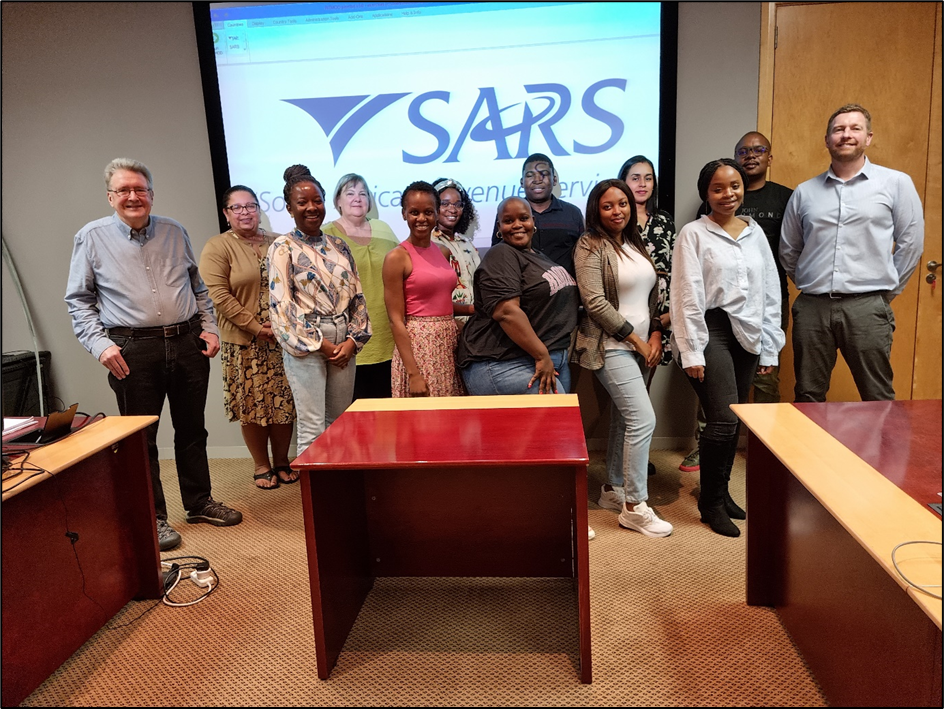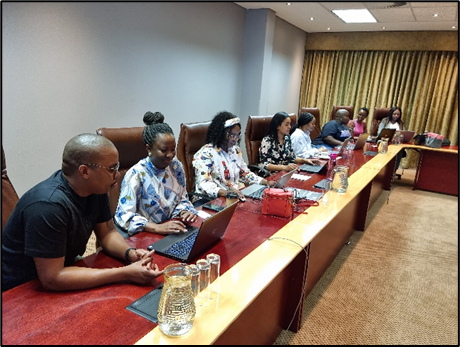News
Joint capacity building initiative enhances SARS staff's data analysis capabilities
As part of a joint capacity building initiative between the Southern Africa – Towards Inclusive Economic Development (SA-TIED) programme and the Southern African Social Policy Research Insights (SASPRI) a training event was held from 13–17 February 2023 for staff at the South African Revenue Services (SARS). The training focused on the Personal Income Tax Microsimulation Model (PITMOD), a key component of the SA-TIED programme.

This collaboration represents SA-TIED’s ongoing efforts to mobilize knowledge and support the building the capacities for different stakeholders to utilize tax administration data for policy formulation and revenue analysis. During the training, participants gained an in-depth understanding of the model, including navigating and interpreting its user interface, running it, and building and implementing basic policy reform. The training also included several exercises conducted in small groups, which allowed participants to put their newly acquired skills to the test. By the end of the event, attendees felt confident and equipped to tackle some complex statistical analyses.
Anonymised individual-level tax administrative records from the data warehouse at SARS underpin PITMOD. Currently, simulations can be undertaken for the tax years 2018 through 2020, with 2021 to follow shortly. To create the tax data for each year, a set of information is used which is provided by SARS. This information is derived and consolidated from IRP5/IT3a tax certificates and ITR12 tax returns including assessed tax returns, and it also includes information on medical insurance contributions from third parties. Each person has one set of information in the dataset, and there are about 15 million people's information in each year's dataset. PITMOD is currently on version 3.0 and runs on a software programme called EUROMOD (version 3.5.8). PITMOD is based on a modeling technique used in another microsimulation model called SAMOD, which simulates taxes and social benefits in South Africa based on survey data.

PITMOD has several direct and indirect benefits for SARS. Direct benefits include the ability to model the current personal income tax system, simulate potential reforms, and enhance the research and analysis skills of SARS staff. The main indirect benefit of using the model is that it improves the quality of the data that SARS uses to administer taxes. The PITMOD team provides feedback on any issues with the accuracy of the data, which helps to make sure the information is reliable. Standardizing taxpayer return data on a common microsimulation platform makes it easier for SARS staff to specialize in maintaining and updating the model. It will also facilitate the manipulation and interpretation of the model for tax policy simulations and revenue projections. More importantly, PITMOD will provide new insights into the taxpayer base, supporting tax administration operations and verifications.
SARS plans to share the PITMOD model with various units, such as the legal division and regional offices. In the future, it plans to expand the use of PITMOD by including the National Treasury and universities.
After the informative training event, SARS staff attended a series of productive meetings to discuss the intricate data development process which supports the PITMOD model. Participants worked collaboratively to identify potential enhancements and refinements to the microsimulation model and agreed on a timeline for finalizing the model.
Overall, the training event was a valuable opportunity for SARS staff to gain insights into the potential benefits of PITMOD for tax policymaking and administration. All partners hope that PITMOD will be essential in the puzzle of bridging the gap between research and policymaking in the southern Africa region.
 Join the network
Join the network